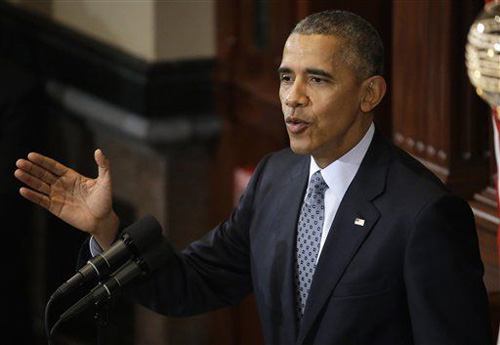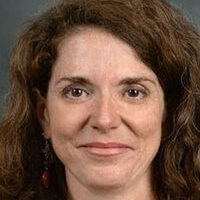
SPRINGFIELD, Ill. – President Barack Obama came home last week to a place that launched his political career – the Illinois state capitol – and addressed lawmakers on creating a “better kind of politics.” Good thing the president could afford to bring his own motorcade, because the state has gone eight months without a budget. Gov. Bruce Rauner might have told the president he would have to take a cab to the statehouse because the state can’t pay for security.
The president spoke Feb. 10 before the Illinois General Assembly about working to make a better political atmosphere in Illinois and the country. State Rep. Mary Flowers, a longtime progressive Democrat, called the speech a “civics lesson” that deserved to be studied. Obama outlined four areas that could improve American politics: restrict big money, stop gerrymandering, make voting easier, and demand a better political culture. But the main thrust of the speech focused on our “poisonous political climate” that “turns folks off” and “makes them cynical.” Without full public participation, Obama said, the “more powerful and extreme voices” take over.
This might have been a dig at Rauner. Illinois is in the midst of a budget crisis brought on by Rauner, who seems hell-bent on remaking the state in the image of a billionaires’ paradise, meaning no unions, tax subsidies for corporations and wealthy individuals, and austerity for the rest of us. Though it’s hard to see how demanding better from Rauner would make a difference: His actions are calculated to damage lives.
State Senator Kwame Raoul said the speech encouraged compromise to a point: “I don’t think his message was to compromise with extremism,” Raoul told the media.
Raoul said he thought the president wanted to encourage cooperation on the state’s budget impasse. “It’s not going to be like a magic wand making things change overnight,” he said, noting that Rauner started out with an “extremist agenda” which “entailed an agenda of attack against higher education.”
“It’s one thing to say that there may be excesses at one or two universities that need to be addressed, but to have the casualties of your agenda be these students … that’s a shame.”
Obama sketched in broad outlines the history of rough and tumble politics, the difficult issues the country and its politicians had to tackle, and the basic sense of fairness he believes the great majority of the American people have. “As Harold Washington once said: ‘Politics ain’t beanbag.’ It’s tough. And that’s okay,” Obama said.
Washington, Chicago’s first Black mayor, spent years building a coalition to help him face attacks on his leadership during his tenure by the remaining mainly white political “machine” built under the first Mayor Richard Daley.
Now, though, it’s hard to imagine how a spirit of working together for the public good can be created, not just in Illinois but nationally. Two days before the president gave his speech, congressional Republicans refused to hear Obama’s budget director present the president’s budget plan, unilaterally ending the 41-year tradition. The day after his speech, GOP presidential candidate Donald Trump, having strung together every derogatory description possible of Muslims, Mexicans, refugees and women, added the vulgar word “pussy” to his chain of tirades. Two days after that Justice Antonin Scalia died, and Senate Majority Leader Mitch McConnell insulted the president and American voters by saying Scalia’s replacement should be chosen by the next president so the “American people [can] have a voice in the selection” (as if Obama’s 2012 re-election didn’t speak loudly enough).
The extremism that has infected the body politic is like a virus from the Right. The president, like many of us, is rightly worried that it could easily turn into sepsis. But our political system reflects an economic and social system that has created extreme wealth inequality on top of inequalities based on race and gender. So long as these conditions persist, politics and voting may appear pointless to many Americans.
In Illinois, public universities are being forced to lay off faculty and staff, since they have received no funds since July 1. Some 125,000 low-income students have been denied Monetary Award Program grants (MAP), and schools have covered the costs up to now. Chicago State University, however, which has historically served African American students and scholars, and because of institutionalized racism has less financial resources, was forced to declare a financial emergency. The school is looking to salvage the spring semester but will have to make steep program and staff cuts. Other universities may make it through the spring, but the summer and fall semesters are not certain. The governor said he would veto a funding bill for MAP, which will force tens of thousands of students out of school.
In the face of such crises, it’s understandable why students may be cynical toward the president’s speech. A Chicago State student leader posted on his Facebook page, “Only good thing that came out of that speech was Obama calling out Ken Dunkin [an African American Democratic state representative who has sided with Rauner]. Other than that, we get ‘Can we all get along?’ and ‘voter registration.’ The same ol’ show. It’s near ballot time and people are only concerned with the vote. We gotta save ourselves.”
While such attitudes are understandable, it is important to remember that politics is an arena of struggle, and building broad-based, flexible coalitions (even with groups and people you don’t agree with on most things) is critical to defeating extremism. Recently, writers at two major Chicago publications signaled to Rauner that he must abandon his extremist push and sign a budget. Crain‘s columnist Greg Hinz called on Rauner to cut a deal and compromise with Democratic leaders in order to stem the damage he has already caused Illinois. A Chicago Sun-Times editorial put it more bluntly, saying the blame for the impasse lies squarely on Rauner’s shoulders, and he needs to compromise.
It’s that big-picture view – and deep abiding confidence in the majority of students, business people, union workers, farmers and farm workers, Democrats, Republicans and independents alike – that seems to motivate Obama to take the case for a better political discourse directly to the people. As tough as it will be, Obama’s words point to the need for people to be directly involved in the political process.
Photo: AP

MOST POPULAR TODAY

Zionist organizations leading campaign to stop ceasefire resolutions in D.C. area


High Court essentially bans demonstrations, freedom of assembly in Deep South

Communist Karol Cariola elected president of Chile’s legislature

Afghanistan’s socialist years: The promising future killed off by U.S. imperialism






Comments